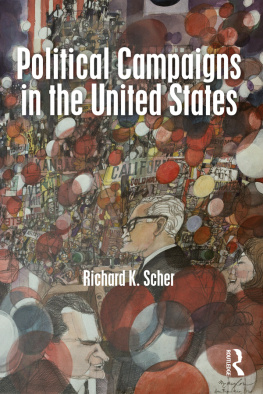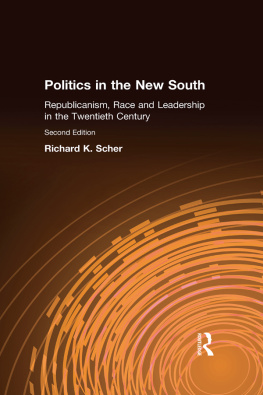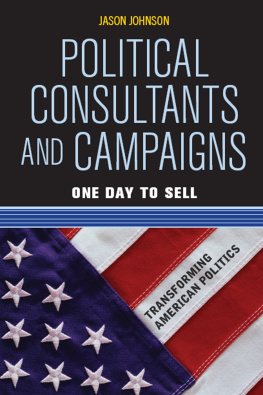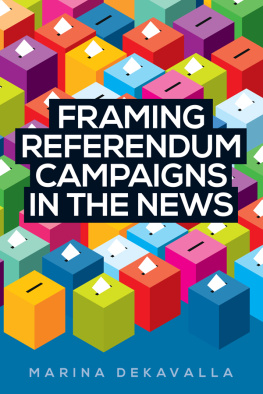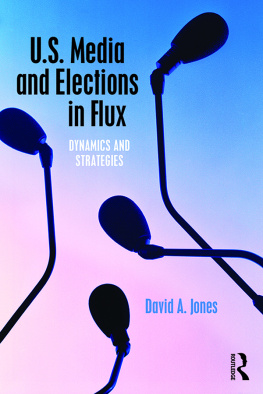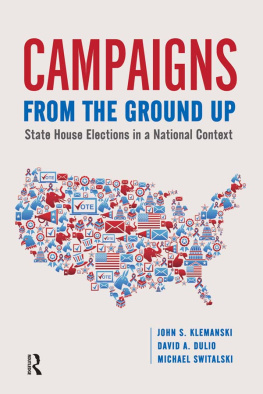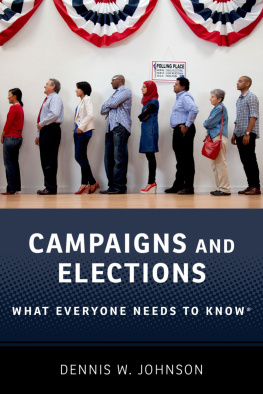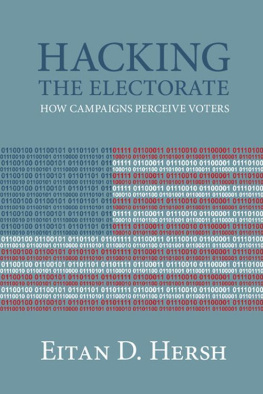Political Campaigns in the United States
This book is an interpretive analysis of political campaigns in America: instead of focusing on how campaigns are designed and run, it investigates the role that campaigns play in our American politics, and the close symbiosis between campaigns and those politics. The text examines how campaigns are an important manifestation of how we do politics in this country.
Hallmarks of this text include:
- showing how campaigns can undermine our democracy and asking how democratic theyand by extension, our politicsreally are;
- demonstrating that the ability of the media to accurately, fairly, and deeply report on campaigns has been severely compromised, both because of the growing distance between campaigns and media outlets and because of the structure of Big Media corporate ownership and its tight relationship to Big Money. It asks important questions about the media including:
- How do the media, reporters in particular, cover campaigns? What pressures and forces shape what and how they present campaigns?
- What is the impact of the ever-increasing chasm separating campaigns and the media?
- How does the close tie between corporate mainstream media and SuperPac money affect campaign coverage?
- How does the ability of campaigns and media to segment voters into ever-smaller slices influence how campaigns are covered?
- tracking the continuing growth of unregulated, private, unaccountable dark money in campaigns as a threat to our democratic elections and politics. Democracy rests fundamentally on transparency and accountabilitysunlightand our campaign laws and norms now allow and encourage exactly the opposite, largely because of decisions by the United States Supreme Court.
Richard K. Scher is Professor of Political Science at the University of Florida, Gainesville.
Professor Richard K. Scher takes a deep dive into the campaigns that drive our politics, and he asks fundamental questions about the electioneering process. Students and readers of all stripes will find the book fascinating and good preparation for interpreting what candidates and the news media say and do each political season.
Larry J. Sabato, University of Virginia Center for Politics
As we strive to meet the permanent need to govern in a time of the permanent campaign, Professor Richard K. Schers book provides important insights into the politics of campaigns.
Mark R. Kennedy, George Washington University
Richard K. Scher does a superb job of demystifying the American political campaign process for the reader. He provides a comprehensive and keen analysis of modern politics and the prominent role that political consultants, media outlets, and big money play in campaigns and elections.
John Allen Hendricks, Stephen F. Austin State University
Political Campaigns in the United States is an excellent introduction to how American political campaigns work and how they have evolved with the increased role money, media, and an expanded professionalized campaign industry. Scher argues that contemporary campaigns are undermining American democracy by turning over them over to a campaign industry that is closely allied with big money and corporate interests, thus undermining the role of everyday voters. He calls for reforms in campaigns, which will bring more transparency, accountability, fairness, and responsiveness which will bring back more vitality and trust in our democracy.
James A. Thurber, American University
Published 2016
by Routledge
711 Third Avenue, New York, NY 10017
and by Routledge
2 Park Square, Milton Park, Abingdon, Oxon, OX14 4RN
Routledge is an imprint of the Taylor & Francis Group, an informa business
2016 Taylor & Francis
The right of Richard K. Scher to be identified as author of this work has been asserted by them in accordance with sections 77 and 78 of the Copyright, Designs and Patents Act 1988.
All rights reserved. No part of this book may be reprinted or reproduced or utilised in any form or by any electronic, mechanical, or other means, now known or hereafter invented, including photocopying and recording, or in any information storage or retrieval system, without permission in writing from the publishers.
Trademark notice: Product or corporate names may be trademarks or registered trademarks, and are used only for identification and explanation without intent to infringe.
Library of Congress Cataloging in Publication Data
Names: Scher, Richard K.
Title: Political campaigns in the United States / Richard K. Scher,
University of Florida.
Description: First edition. | New York ; Milton Park, Abingdon,
Oxon : Routledge, 2016.
Identifiers: LCCN 2015035172| ISBN 9781138181830 (hardback) |
ISBN 9781138181861 (pbk.) | ISBN 9781315646732 (ebook)
Subjects: LCSH: Political campaignsUnited StatesHistory.
Classification: LCC JK2281 .S345 2016 | DDC 323.70973dc23
LC record available at http://lccn.loc.gov/2015035172
ISBN: 978-1-138-18183-0 (hbk)
ISBN: 978-1-138-18186-1 (pbk)
ISBN: 978-1-315-64673-2 (ebk)
Typeset in Sabon
by FiSH Books Ltd, Enfield
For Aida, Nada, and AH, whom I never had the pleasure of meeting
For Nick and Catherine and Greg, wherever and however he is
For Coby and Amy, and Eric and Danny
And for my late parents, who awakened my interest in politics and campaigns (Eisenhower/Stevenson, 1952) and who always encouraged me to learn
Contents
This is a unique book. It is not about how to do campaigns, although readers will learn a good deal about how campaigns are structured and how they go about their business of getting candidates elected to office, or ballot initiatives passed (or defeated). It is not a case study of any particular campaign, presidential or otherwise, although many examples and anecdotes from past campaigns will be cited to help illustrate points or strengthen arguments. Nor is it a history of campaigns, although the author firmly believes that looking backwards can help illuminate the present and, perhaps, the future.
Rather, this book is about the politics of campaigns. It explores how campaigns have become part and parcel of our regular, everyday politics. The book asks how and why our political campaigns take the shapes and forms they do and how they illustrate broader themes in American politics. In short, it argues that our campaigns are an important manifestation of how we do politics in America. It looks at who are the candidates, how they emerge, and what are the consequences of the forces through which they do so. It further examines the playersespecially the Campaign Industry, media, and moneythat strongly determine how campaigns go forward, and their impact on the interested (and voting) public. And finally it asks how our political campaigns may be undermining the quality and health of democratic elections in America, and thus our politics more broadly writ.
****
At the outset, perhaps it is important to state what this book does not deal with. It does not, for example, ask why political campaigns even exist. We know that something like campaigns go back at least to Roman times, and probably before then.
But do democratic elections actually require the existence of political campaigns? Given the sophistication of modern marketing techniques, and the increasing universality of digital media, why go through all the hoopla and tumult and expense of political campaigns? After all, they rely on very sophisticated statistical models (which we will meet in a later chapter) that can very accurately identify and cull out individuals and groups likely to vote for a given candidate, but not for another. Could not these high-end marketing techniques render campaigns irrelevant and obsolete? Couldnt we do something else and still have elections that could be called democratic? These are interesting questions, but we shall leave them to other students of elections, journalists, pundits, and the like.

